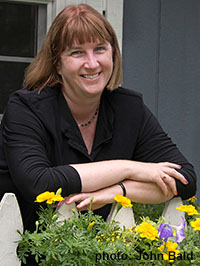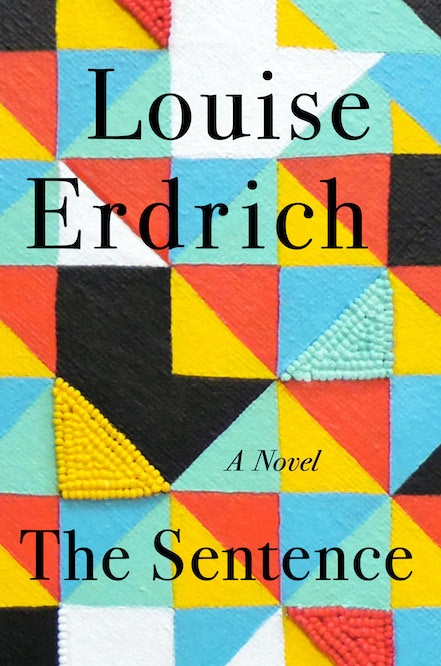Living Kindly in the World
Cynthia Lord’s new middle-grade novel is almost a parable of empathy
In coastal Maine’s Washington County, wild blueberries grow thick on rolling plains of sandy soil. It’s not hard to imagine all sorts of delicious stories rising up from these blueberry barrens, where most of the wild blueberries sold and consumed in the United States are harvested. In Cynthia Lord’s latest middle-grade novel, A Handful of Stars, the barrens present a rich backdrop for a story of two new friends, Lily and Salma, whose families’ livelihoods are dependent on the local agricultural economy.
 The girls meet when Lily, whose grandparents run the town’s general store, chases her dog, Lucky, into the blueberry barrens. There Lucky snatches a sandwich belonging to Salma, the daughter of a family of migrant fruit-pickers from Florida. Lucky’s lunch nab turns out to be a happy accident, of course: Salma and Lily not only quickly establish an easy camaraderie but also decide to collaborate on a fundraising project. Lily has been stenciling mason-bee houses built by her grandfather and then selling them in the store to raise money for an eye operation for the aged Lucky, who is slowly losing his sight.
The girls meet when Lily, whose grandparents run the town’s general store, chases her dog, Lucky, into the blueberry barrens. There Lucky snatches a sandwich belonging to Salma, the daughter of a family of migrant fruit-pickers from Florida. Lucky’s lunch nab turns out to be a happy accident, of course: Salma and Lily not only quickly establish an easy camaraderie but also decide to collaborate on a fundraising project. Lily has been stenciling mason-bee houses built by her grandfather and then selling them in the store to raise money for an eye operation for the aged Lucky, who is slowly losing his sight.
Salma is eager to lend her artistic talent to the cause, but Lily has her qualms. Salma’s designs are whimsical—pink bees!—and wildly colorful, a far cry from Lily’s own realistic stencil work. But when Salma’s houses turn out to be better sellers, Lily must parse some complex emotions: she’s happy to make more money for the Lucky fund but discouraged by customers’ preference for Salma’s quirky bee houses. Lily’s mother, who died when Lily was two, was herself a vibrant, creative woman, and Lily wonders sadly if her mother would have found her daughter too ordinary: “Sometimes I wondered what Mama would have thought of me. Deep inside, I was afraid she might’ve been disappointed that I wasn’t more like her.”
 As Lily and Salma grow closer and embark on a new project to restore Lucky’s eyesight, Lily has occasion to consider their other differences. That reflection arouses in her the kind of healthy discomfort that comes with truly experiencing diversity for the first time. Lily is grounded in small-town Maine; her grandparents are secure, though not by any means wealthy. Salma, by contrast, is always on the move; her family, housed temporarily in a one-room cabin just like all the migrant workers, must share a kitchen with the rest of the camp. When at one point Lily suspects an adult of discriminating against Salma, she feels angry. “I gave Mrs. LaRue a steely look that surprised even me,” she says.
As Lily and Salma grow closer and embark on a new project to restore Lucky’s eyesight, Lily has occasion to consider their other differences. That reflection arouses in her the kind of healthy discomfort that comes with truly experiencing diversity for the first time. Lily is grounded in small-town Maine; her grandparents are secure, though not by any means wealthy. Salma, by contrast, is always on the move; her family, housed temporarily in a one-room cabin just like all the migrant workers, must share a kitchen with the rest of the camp. When at one point Lily suspects an adult of discriminating against Salma, she feels angry. “I gave Mrs. LaRue a steely look that surprised even me,” she says.
But Lily also enjoys having newly expanded horizons, the pleasures of which sometimes manifest in surprising ways. When her friend Hannah is dubious about Salma’s blueberry enchiladas (“I’ve only ever had beef or chicken”), Lily pipes up, promising that the dish is tasty. “Hannah’s usually the first to do new things, so it was nice to be first for once,” she thinks. Through her friendship with Salma, Lily’s confidence grows, and she’s pushed to think of herself as more than just a “regular girl.”
A Handful of Stars is juicy with such subtly effective moments, wherein Lily is prompted to rethink an assumption, question a prejudice, or act on a belief. Lord, in short, elegantly pulls off the trickiest challenge of writing for middle-grade readers: hitting lots of meaningful notes without didacticism. She writes with an exquisitely gentle but thorough approach, peppering the narrative with dialogue and details and observations designed to (gently) provoke children to learn from this engaging tale of friendship. And if the characters are perhaps a bit sweeter to one another than contemporary kids might realistically be? Well, they’re a refreshing example to share with young people, who have so much yet to learn through the pages of books about the world and how to live kindly in it.

Susannah Felts is a writer, editor, and educator in Nashville, as well as co-founder of The Porch Writers’ Collective, a nonprofit literary center. She is the author of This Will Go Down On Your Permanent Record, a novel, and numerous journal and magazine articles.


